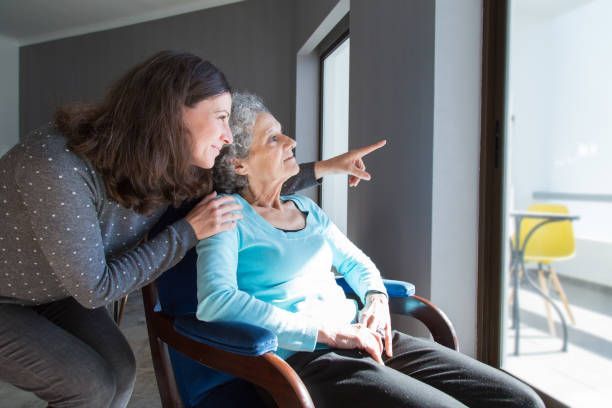What are the Duties of a Home Health Aide?
What are the Duties of a Home Health Aide?
It's paramount for clients, patients, and their families to grasp the full scope of a
home health aides' duties to establish clear expectations and foster a strong, trusting relationship. Understanding the responsibilities of a home health aide enables clients and their families to communicate their needs effectively, ensuring that care is tailored to meet individual preferences and requirements. Moreover, a transparent understanding of the aide's duties promotes collaboration and cooperation between all parties involved, facilitating a positive caregiving experience for everyone. By recognizing the pivotal role that home health aides play in supporting their loved ones, clients and families can cultivate a sense of appreciation and respect, further enhancing the quality of care provided. Clear communication and mutual understanding lay the foundation for a harmonious and effective partnership between home health aides and those they serve, ultimately promoting better outcomes and overall satisfaction with the caregiving experience.

Are You Searching for a Certified Home Health Aide Near Me?
In the field of healthcare, home health aides play a crucial role in ensuring the well-being and comfort of individuals who require assistance with daily activities in the comfort of their homes. At 7 Day Home Care, a premier home care service agency serving Manhattan, Queens, Brooklyn, and Long Island, New York, our team of dedicated professionals understands the importance of providing compassionate and skilled care to our clients. In this comprehensive guide, we review the duties of a home health aide, the certification process, and the ongoing training and education required to excel in this rewarding field.
Duties of a Home Health Aide Near You
Home health aides are responsible for assisting clients with various tasks to help them maintain their independence and quality of life. Some of the key duties include:
- Personal Care: Home health aides assist clients with personal hygiene tasks such as bathing, grooming, and dressing. They may also help with toileting and incontinence care, ensuring the client's comfort and dignity.
- Mobility Assistance: Many clients require assistance with mobility due to age, illness, or injury. Home health aides help clients move around safely, whether it's transferring from bed to wheelchair, walking with assistive devices, or providing support during exercise routines.
- Medication Management: Ensuring clients take their medications as prescribed is another essential duty of a home health aide. This may involve reminding clients to take their medications on time, and keeping track of medication schedules.
- Meal Preparation: Home health aides help clients maintain proper nutrition by preparing meals according to their dietary needs and preferences. They may also assist with feeding if necessary, ensuring that clients receive adequate nourishment.
- Light Housekeeping: Keeping the client's living space clean and organized is part of a home health aide's responsibilities. This may include tasks such as laundry, dishes, sweeping, and dusting, creating a safe and comfortable environment for the client.
- Companionship: Loneliness and isolation can have a significant impact on an individual's well-being. Home health aides provide companionship to clients, engaging in conversation, playing games, or accompanying them on outings to promote socialization and mental stimulation.
- Monitoring Vital Signs: In some cases, home health aides may be responsible for monitoring clients' vital signs, such as blood pressure, pulse, and temperature, and reporting any abnormalities to the appropriate healthcare professionals and family.
Home Health Aide Certification Process
Becoming a certified home health aide requires completing a state-approved training program and passing a competency evaluation. The certification process typically includes the following steps:
- Education: Prospective home health aides must complete a state approved training program that covers topics such as personal care skills, infection control, safety procedures, and communication techniques. Training programs are offered by community colleges, vocational schools, and healthcare agencies.
- Clinical Experience: Many training programs include hands-on clinical experience, allowing students to gain practical skills under the supervision of experienced instructors.
- Competency Evaluation: After completing the training program, aspiring home health aides must pass a competency evaluation administered by their state's Department of Health or another authorized agency. The evaluation typically includes written and skills-based tests to assess the candidate's knowledge and abilities.
- Certification: Upon successful completion of the competency evaluation, candidates are awarded a certificate or license that allows them to work as home health aides in their state.
Home Care Agency Nurse Supervises Home Health Aides
Home health aides operate under the guidance and supervision of a home care agencies registered nurse, who serves as a crucial point of contact for coordinating and overseeing the client's care plan. Working closely with the registered nurse, home health aides adhere meticulously to the care plan established for each client, ensuring that all prescribed treatments, medications, and interventions are carried out with precision and compassion. They diligently follow the registered nurse's instructions regarding the client's medical needs, safety protocols, and any changes in their condition, providing regular updates and feedback to support the continuity and effectiveness of care. By aligning their efforts with the registered nurse's care plan, home health aides uphold the highest standards of professionalism and accountability, contributing to the well-being and comfort of the clients they serve.
Home Health Aide In-Service Training and Education Near You
The field of home healthcare is constantly evolving, with new techniques, technologies, and regulations emerging regularly. To provide the highest level of care to clients, home health aides must participate in ongoing in-service training and education. Some of the key components of continuing education for home health aides include:
- In-Service Workshops: Home care agencies often offer in-service workshops and training sessions to keep their staff up-to-date on the latest best practices and industry standards. Topics may include infection control, dementia care, fall prevention, and emergency procedures.
- Continuing Education Courses: Home health aides may also pursue continuing education courses through community colleges, online platforms, or professional organizations. These courses cover a wide range of topics relevant to the field, allowing aides to expand their knowledge and skills.
- Specialized Training: Depending on the needs of their clients, home health aides may seek out specialized training in areas such as Alzheimer's care, diabetes management, or hospice care to provide tailored support and assistance.
Home health aides play a vital role in supporting individuals who require assistance with daily activities due to age, illness, or disability. At 7 Day Home Care, we are committed to providing compassionate and skilled care to our clients in Manhattan, Queens, Brooklyn, and Long Island, New York. By understanding the duties of a home health aide, completing the certification process, and engaging in ongoing training and education, professionals in this field can make a meaningful difference in the lives of those they serve. To learn more about our home health aide agency care services near you, please call 516-408-0034 or visit 7 Day Home Care.
Brian Callahan
7 Day Home Care










